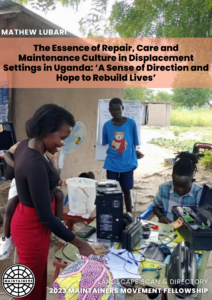“THE ESSENCE OF REPAIR, CARE AND MAINTENANCE CULTURE IN DISPLACEMENT SETTINGS IN UGANDA: A Sense of Direction and Hope to Rebuild Lives” by Mathew Lubari
You can download Mathew’s Landscape Scan here.
“Despite the challenges, a culture of repair in displacement settings can contribute to the resilience and self-sustainability of the community and the global transition to circular economies.”
– Mathew Lubari, 2023 Fellow in the “Maintenance Cultures” Pathway
Summary
This report gathers knowledge on the culture of repair within displacement settings, specifically examining the Rhino Camp Refugee Settlement in Uganda, which houses over 1.5 million refugees. While the refugee community at Rhino Camp faces multiple obstacles such as electronic waste and material scarcity, it is also an excellent example of refugee entrepreneurship and leadership, as is the case of collectives such as Community Creativity for Development (CC4D) . The report explores repair cafe practices, repair knowledge as self-sufficiency and professional development in displacement settings, and the ways in which women’s inclusion in repair workshops can serve to tackle gender-based discrimination. This report highlights circular economy as a means of survival, and highlights the leadership of refugee-led work within the global repair movement.
Insights
- Refugee camp economies depend on the host country and the governance and policies dictated by agencies, and the unique demographic make up of who is in the camp. Repair cafes in this setting can serve different purposes depending on these characteristics.
- Promote self-sufficiency and resourcefulness, in situations of material scarcity.
- Education: youth can be trained into a trade or profession, and older people can learn an important skill to repair their belongings.
- A measure against social discrimination: For example, Mathew Lubari looks into how women tend to participate less in repair cafes, and how encouraging participation can be a means to reduce sexism or gender-based discrimination.
- Similar to other parts of the world, repair cafes create community and a sense of cohesion. There are, however, some biases related to gender, as often the repair of electronics or hardware is more appealing for men.
- Attitudes toward repair are often class-dependent, as seen in the gendered division of shelter maintenance, where women handle routine tasks like smearing home walls, while men tackle technical repairs like fixing roofs.
- “Replace” culture – a tendency to get new objects over repairing- is influenced by higher education and purchasing power, with repair often linked to economic necessity or class distinctions.
- Mathew understands repair levels as connected to the item’s type of failure: partial failure is when there is a component that doesn’t work, and full failure is when the device is unusable.
It is critical to elevate global south BIPOC leadership in the repair movement as well as the circular economy transition. It is also critical to elevate refugee leadership and entrepreneurship in these settings as well.
For more of Mathew’s work, check out his Maintainers profile.
